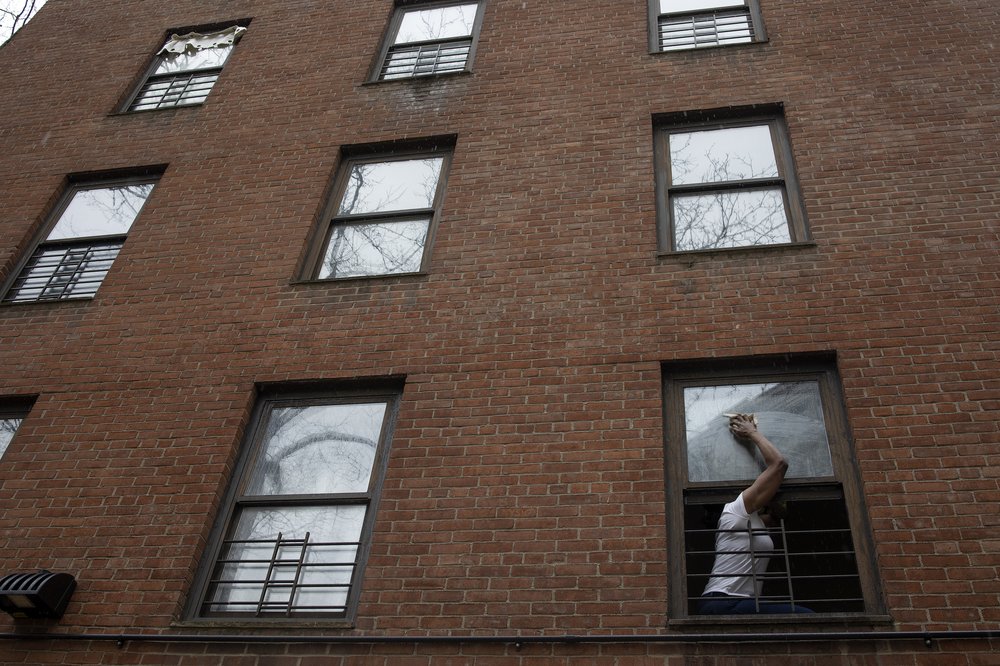NYC public housing residents fleeing domestic violence face lengthy waits, report finds
Dec. 17, 2024, 6:01 a.m.
A report says roughly 2,000 domestic violence survivors were waiting for transfers out of apartments with their abusers — some for years — as of September.

Thousands of New York City public housing residents are waiting for emergency transfers to new homes, often for years, as they try to flee domestic violence in their current apartments, according to a new report. It urges city officials to expedite the moves in order to avoid further harm to those residents.
Attorneys from the nonprofit Legal Services NYC say the New York City Housing Authority, or NYCHA, has failed to comply with federal rules that require the city to expedite transfer applications filed by survivors of domestic violence at the same priority level as others seeking emergency moves due to dangerous conditions or health risks. Roughly 2,000 households that applied for transfers as a result of domestic violence, most of them headed by women, were on the waiting list as of September, the report found.
Last year, about 19,000 households sought transfers or moves into a new apartments for a variety of reasons, according to the report.
Current NYCHA policy lists domestic violence transfers among the lowest priority moves, placing them in the same tier as residents with commutes of more than 90 minutes and tenants with “long-term friction with neighbors,” according to the report
“This to me is perplexing. It’s confounding. It makes no sense,” said Legal Services NYC attorney Luis Henriquez, one of the report’s authors. “It is very much not an emergency transfer. It is the opposite of an emergency transfer.”
Henriquez recommended NYCHA instead include survivors of domestic violence among the highest priority tier, alongside residents living in uninhabitable conditions that threaten their health.
“ What is happening to domestic violence survivors waiting so long for an apartment is very dangerous,” Henriquez said. “Not only the exposure to harm, but they are actually suffering harm.”
Henriquez and his co-authors said NYCHA should make use of more than 5,000 vacant apartments. Those apartments remained vacant for an average of roughly 14 months during the 2024 fiscal year that ended June 30, up from around three months in the 2020 fiscal year, according to city statistics.
A separate report issued earlier this year by the federal Government Accountability Office found problems affecting safety transfers within public housing agencies across the country. But it also noted that other agencies give survivors the highest priority for moves. The federal Violence Against Women Act requires public housing authorities to give survivors of domestic violence the same priority as other emergency requests when it comes to internal transfers, according to the Government Accountability Office report.
NYCHA spokesperson Michael Horgan said the agency attempts to move residents at risk of violence as quickly as possible and offers them Section 8 vouchers that allow them to move into private housing. NYCHA also provides survivors of domestic and gender-based violence more flexibility to turn down apartments if they deem them unsafe.
“NYCHA continues to evaluate its transfer policies on a regular basis and strives to facilitate [Violence Against Women Act-related] transfers as quickly and efficiently as possible — and with enhanced transparency — while aligning with applicable laws and regulations, consent decrees and other requirements,” Horgan said in a statement.
NYCHA data shows the agency had completed 411 emergency transfers as of Dec. 15, up from 230 last year. The average time for an emergency transfer is now 797 days, according to statistics the agency shared with Gothamist.
The report, released Tuesday, describes the experiences of four women who applied for emergency transfers as a result of violence and abuse.
One woman named Sarah, who spoke with Gothamist, said she applied for an emergency transfer in November 2021 to escape an abusive relationship with the father of her children. A few months later, she said, she was attacked by a person associated with the man she was trying to escape.
Sarah, who asked not to use her last name or current whereabouts to avoid detection by her alleged abusers, said she was stabbed in front of her children and hospitalized. They later entered a homeless shelter to try to find safety.
“I tried to see if they would speed up the transfer and they wouldn’t,” Sarah said. “I didn’t want to go outside. It was scary.”
She said she began working with attorneys from Legal Services NYC in December 2022, more than a year after requesting the transfer. The attorneys determined that Sarah could qualify for a transfer based on her health as a result of her treatment for post-traumatic stress disorder and depression. NYCHA gives these types of applications, known as reasonable accomodation requests, a higher priority under the federal Americans with Disabilities Act.
NYCHA identified a vacant apartment for Sarah and her children in the summer of 2023, more than a year and a half after she first applied for a move. She said she felt lucky to survive.
“Even after the assault, I still had to be in that environment [where] the person who assaulted me could finish the job,” she said.
NYCHA tenants sue city, saying agency does not disclose rats, lead, other hazards 2,000 NYCHA apartments in Manhattan to be torn down under controversial redevelopment plan